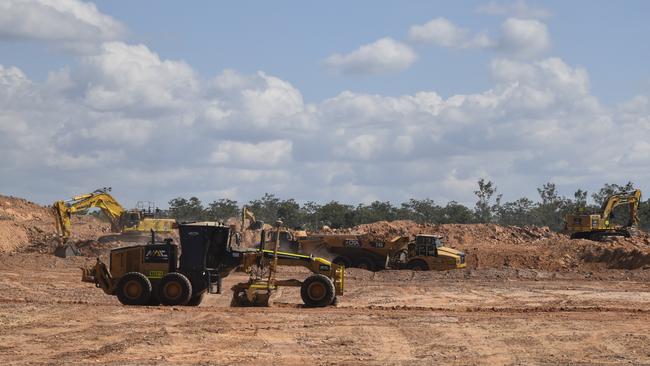Chaos at Core as miner wields jobs axe
A high-profile Territory company has begun laying off staff as it battles The Wet and declining markets. Read what’s happening.
Business
Don't miss out on the headlines from Business. Followed categories will be added to My News.
Potentially hundreds of jobs have been lost in the Top End in recent weeks with more to come as a Northern Territory miner sheds staff in response to poor market conditions and The Wet.
The Territory’s newest miner, Core Lithium, has been laying-off staff since the NT News revealed on December 22 it was cutting mine operations and suspending works at its new BP33 project.
A bad year got worse this week when the Australian Stock Exchange named Core the worst performing stock in 2023, reporting a 75 per cent decline for the year and finishing 2023 at a miserly 26 cents.
At its peak in November 2022 - a month after the mine officially opened - Core’s share price hit $1.67.
In a twist, the company’s share price began 2024 up seven per cent, on the back of investors scouring the market for bargain buys.

Contractors Northern Australia Civil and Lucas Contract Solutions have both removed staff from Core’s Finniss mine site.
Both companies declined to comment on the number of jobs lost, referring questions to Core Lithium.
People close to the project who have contacted the NT News estimated up to 150 jobs had so far been lost, with potentially more to come.
“There were people dumped days out from Christmas,” one caller said.
“We were expecting changes but the timing was terrible.”
Speaking to the NT News, Core chief exeutive Gareth Manderson confirmed job losses but did not specify a number pending the release of a review or the mine’s operations to be presented at the company’s quarterly meerting on January 22.
In late December the company announced a number of measures to reduce costs including halting development of the BP33 second mine project, prioritising ore mining and the possible “temporary curtailment” of mining operations, commercial solutions and reductions in exploration.
“We were going to push through with BP33 during the wet season but pulled back due to market conditions,” Mr Manderson said.
The price of spodumene concentrate dropped by more than 80 per cent in 2023, including by 40 per cent since October, which he said had clearly impacted markets.
“I think the medium to long term for the battery metals sector is still positive but obviously there is softness at the moment,” Mr Manderson said.
“We are seeing a reduction in demand around electric vehicles, which flows through, but is associated with general market conditions at the moment.
“Look at the cost of living, at interest rates and where they are at and the curbing of demand isn’t surprising in that context.
“I think we need to wait to see how it plays out but as late as last year I still had people who were interested in offtake in the medium term. I think we need to just let this softness in the market play out and take the cues from there.
“The best thing we can do for the NT is be sure we run a good business and to understand how to manage through all market conditions.”
Chief Minister Eva Lawler said global factors determined lithium prices but was ultimately optimistic the project would deliver dividends to investors and shareholders.
“We are seeing such an increase demand for lithium, which also prompts more mining around lithium, so there needs to be a bit of a levelling out and a sorting out around that,” she said.
When it opened in October 2022, Core was just the Northern Territory’s eighth operating mine.
Ms Lawler said lithium mining and production was part of diversifying the NT economy.





